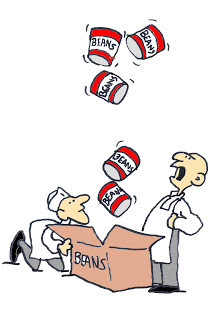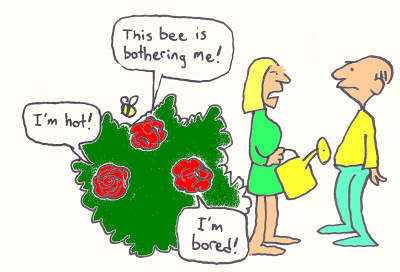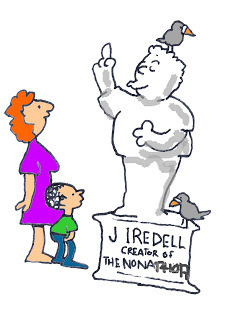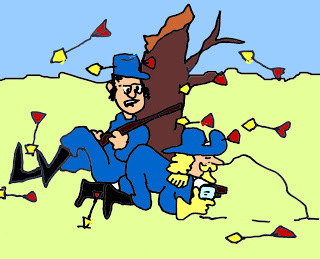Man Martin's Blog, page 212
December 31, 2011
STOOPID CONTEST - December 31st!
DECEMBERSTOOPID CONTEST
 Dang it! It's the same blame thing every time!
Dang it! It's the same blame thing every time!
I can't stand it!
Can you guess the name of the Kundera novel and Daniel Day Lewis movie represented by this picture?
Email your guess along with your name and address to manmartin@manmartin.net. The winner, selected at random from the correct entries will receive an autographed copy of Paradise Dogs, selected by Atlanta Magazine as one of the top five novels for 2011! to be delivered directly to your residence by a paid representative of the US Government!
Last Month's Puzzle
 "They've been like this all week!"The answer, "Days of Whinin' Roses," was submitted by Peter Fontaine. Peter points out that time flies like an arrow, but fruit flies like a banana. Peter wins a copy of Scoring Bertram Wiggly.
"They've been like this all week!"The answer, "Days of Whinin' Roses," was submitted by Peter Fontaine. Peter points out that time flies like an arrow, but fruit flies like a banana. Peter wins a copy of Scoring Bertram Wiggly.
DECEMBERSTOOPID CONTEST
 Dang it! It's the same blame thing every time!
Dang it! It's the same blame thing every time!I can't stand it!
Can you guess the name of the Kundera novel and Daniel Day Lewis movie represented by this picture?
Email your guess along with your name and address to manmartin@manmartin.net. The winner, selected at random from the correct entries will receive an autographed copy of Paradise Dogs, selected by Atlanta Magazine as one of the top five novels for 2011! to be delivered directly to your residence by a paid representative of the US Government!
Last Month's Puzzle
 "They've been like this all week!"The answer, "Days of Whinin' Roses," was submitted by Peter Fontaine. Peter points out that time flies like an arrow, but fruit flies like a banana. Peter wins a copy of Scoring Bertram Wiggly.
"They've been like this all week!"The answer, "Days of Whinin' Roses," was submitted by Peter Fontaine. Peter points out that time flies like an arrow, but fruit flies like a banana. Peter wins a copy of Scoring Bertram Wiggly.
Published on December 31, 2011 02:33
December 30, 2011
Non Sequitur December 30, Figures of Speech
 "Welcome to the department of non sequiturs.
"Welcome to the department of non sequiturs.Pull up a molar and start treading hay bubbles!"Non Sequitur: From Latin, literally, "does not follow." This is a figure of speech in which a piano, and by the way, I do mean a piano with breasts. You get the idea. Just good old fashioned nonsense, that's what. It's hard to come up with a decent non sequitur because the blackberry hoppers keep getting stuck in the transmission. And then with the weather like it is. A video of one of the masters of non sequitur, Durwood Fincher, is below. Durwood demonstrates that on the other hand, you have different fingers.
Published on December 30, 2011 02:13
December 29, 2011
Syllepsis December 29, Figures of Speech
 First he made himself emperor,
First he made himself emperor,then a nice salad.Syllepsis: A type of pun in which a single word is used with two different senses in the same sentence. "The sky was falling and so were my hopes," "I called her a tramp and myself a taxi." Writers from Alexander Pope - "great Anna! whom three Realms obey, Dost sometimes Counsel take - and sometimes Tea" - to Tim O'Brien - "He carried a strobe light and the responsibility for the lives of his men" have used syllepsis. The master of the syllepsis, of course, was Groucho Marx, who said, "You can leave in a taxi. If you can't get a taxi, you can leave in a huff. If that's too soon, you can leave in a minute and a huff."
Published on December 29, 2011 02:22
December 28, 2011
Nonaphor December 28, Figures of Speech
 Nonaphor: Don't bother looking this one up on Wikipedia, this blog is the only place you'll find it. Anyone can tell you that a metaphor is a direct comparison between two unlike things without using "like" or "as." A nonaphor is a comparison between one thing and itself. It is the discovery of my good friend, Jamie Iredell. It is not everyone who gets to create their own figure of speech, but Jamie did it. A typical nonaphor might be "the chili tasted like chili," or "the mountains mountained up," achieving a strange sort of lyricism and a ruthless realism. There is also the Extended Nonaphor, which starts of like a regular metaphor or simile, "He was as mighty as the ocean, if the ocean could bench press three hundred pounds and run a mile in seven minutes."
Nonaphor: Don't bother looking this one up on Wikipedia, this blog is the only place you'll find it. Anyone can tell you that a metaphor is a direct comparison between two unlike things without using "like" or "as." A nonaphor is a comparison between one thing and itself. It is the discovery of my good friend, Jamie Iredell. It is not everyone who gets to create their own figure of speech, but Jamie did it. A typical nonaphor might be "the chili tasted like chili," or "the mountains mountained up," achieving a strange sort of lyricism and a ruthless realism. There is also the Extended Nonaphor, which starts of like a regular metaphor or simile, "He was as mighty as the ocean, if the ocean could bench press three hundred pounds and run a mile in seven minutes."There is no statue to Jamie Iredell, Inventor of the Nonaphor. There ought to be. It ought to be as tall as a statue and made out of solid statue-material.
Published on December 28, 2011 02:25
December 27, 2011
Kenning December 27, Figures of Speech
 Dang it, Hrothgar! This is no time
Dang it, Hrothgar! This is no timefor your fancy kennings!Kenning: A type of metaphor usually made of a compound noun, as in "Whale road," for sea or "battle-dew" for blood. Kenning comes from ken, "to know or understand," and that's exactly what a kenning it, it's an understanding that the sea is to whales as a road is to travelers. Usually associated with Anglo-Saxon poetry, there are plenty of kennings around us today as in "eye candy" and "brain fart."
Published on December 27, 2011 02:25
December 26, 2011
Parallelism December 26, Figures of Speech
 Let's see... Life, Liberty, and Free Parking... No, no. Life,
Let's see... Life, Liberty, and Free Parking... No, no. Life,liberty, and kittens!... No, that's no good. Life, liberty, and
call now and we'll double your order!... And free shipping...
Dang it! And this handy carrying case! Basketball...
Life, liberty, and a money-back guarantee...Parallelism is a series of phrases or clauses with similar grammatical structures. Usually we think of parallel phrases coming in threes, like Mamma Bear, Pappa Bear, and Little Bitty Baby Bear. "I came, I saw, I conquered," Caesar said, crossing the Rubicon and demonstrating a handiness with rhetoric. Parallelism is especially effective when combined with auxesis or climax, when the three terms are arranged in ascending order of importance: "Life, liberty, and the pursuit of happiness," for example. You have to be alive to have liberty, and you need liberty to pursue happiness. Locke's original formulation of "life, liberty, and property," flatlines by comparison.
Published on December 26, 2011 02:29
December 25, 2011
Inverted Syntax December 25, Figures of Speech
Merry Christmas, Everyone!
 Cornsarn it, General! This ain't no time for your
Cornsarn it, General! This ain't no time for your
fancy inverted syntax!Inverted Syntax: This is the reversal of the normal sentence order. Usually it's a good idea to stick to normal subject-verb-compliment order for the sake of clarity if for no other reason. Just try getting a bunch of highschool students to parse out a sentence like Bryant's "To him who in the love of nature holds communion with her visible forms, she speaks a various language." But sometimes Inverted Syntax is just cool. It adds a certain gravitas to an otherwise plain sentence. "In God we trust," is just plain better than "We trust in God." Moreover, Inverted Syntax lets you postpone the meaning of the sentence until the end for greater impact. "The man was bitten by an alligator," has more punch - more "bite" if you will - than "An alligator bit the man." And in the spirit of Christmas, look how beautifully Luke's Inverted Syntax holds us in suspense about the angel's "good tidings" until the very last phrase:And the angel said unto them, Fear not: for, behold, I bring you good tidings of great joy, which shall be to all people. For unto you is born this day in the city of David, a Saviour, which is Christ the Lord.

 Cornsarn it, General! This ain't no time for your
Cornsarn it, General! This ain't no time for yourfancy inverted syntax!Inverted Syntax: This is the reversal of the normal sentence order. Usually it's a good idea to stick to normal subject-verb-compliment order for the sake of clarity if for no other reason. Just try getting a bunch of highschool students to parse out a sentence like Bryant's "To him who in the love of nature holds communion with her visible forms, she speaks a various language." But sometimes Inverted Syntax is just cool. It adds a certain gravitas to an otherwise plain sentence. "In God we trust," is just plain better than "We trust in God." Moreover, Inverted Syntax lets you postpone the meaning of the sentence until the end for greater impact. "The man was bitten by an alligator," has more punch - more "bite" if you will - than "An alligator bit the man." And in the spirit of Christmas, look how beautifully Luke's Inverted Syntax holds us in suspense about the angel's "good tidings" until the very last phrase:And the angel said unto them, Fear not: for, behold, I bring you good tidings of great joy, which shall be to all people. For unto you is born this day in the city of David, a Saviour, which is Christ the Lord.
Published on December 25, 2011 13:03
December 24, 2011
Onomatopoeia December 24, Figures of Speech
 Onomatopoeia, which oddly enough sounds nothing like what it means, is a word that imitates a sound. We are familiar with onomatopoeia from the old Batman show with its "biff!" and "bam!" sound effects superimposed over the fight scenes and old Don Martin cartoons which rendered the sound of a steam roller inexorably squooshing someone as "squelllge." Roy Blount Jr points out there's lots of unsuspected onomatopoetic qualities in words all around us. He calls this "sonicky." To give just one example, the word "asphyxiate" requires us to tighten our throats slightly as we pronounce it, simulating asphyxiation.
Onomatopoeia, which oddly enough sounds nothing like what it means, is a word that imitates a sound. We are familiar with onomatopoeia from the old Batman show with its "biff!" and "bam!" sound effects superimposed over the fight scenes and old Don Martin cartoons which rendered the sound of a steam roller inexorably squooshing someone as "squelllge." Roy Blount Jr points out there's lots of unsuspected onomatopoetic qualities in words all around us. He calls this "sonicky." To give just one example, the word "asphyxiate" requires us to tighten our throats slightly as we pronounce it, simulating asphyxiation.The catch with onomatopoeia is that even what we would consider fairly unambiguous sounds are capable of a wide variety of interpretations. For example, in America cows moo, while in England, they low. Moo and low are at least somewhat similar, and everyone around the world seems to agree that to make a bee sound, the letter "Z" must be employed. But whereas in America, dogs say "Woof! Woof!" or in extreme cases, "Bow-wow!" (I have never once heard a dog go "bow-wow" but I have it on good authority, they do.), in France they seem to go "ouah, ouah!" To be fair, I can imagine that "oauh, oauh," exclaimed with a certain level of bravura might sound effectively canine, but how are we to account for Russian where evidently they go, "gav gav." I have never been to Russia, but it makes me want to go there, if for no other reason than to hear one of their dogs.
Published on December 24, 2011 02:38
December 23, 2011
Sophistry December 23, Figures of Speech
 "We didn't lay a hand on it."Sophistry is a plausible-seeming but misleading argument, often involving telling a partial truth with the intent to deceive. It comes from a Greek work meaning "wise," and the original Sophists were a school of philosophers; however, they were so ridiculed by Socrates that the word came to mean any logician who makes falsehood seem true.
"We didn't lay a hand on it."Sophistry is a plausible-seeming but misleading argument, often involving telling a partial truth with the intent to deceive. It comes from a Greek work meaning "wise," and the original Sophists were a school of philosophers; however, they were so ridiculed by Socrates that the word came to mean any logician who makes falsehood seem true.A famous piece of sophistic cross-examination runs thus.
Sam: You're a son of a bitch.
Joe: I am not.
Sam: I can prove it. Isn't it true that you own a dog?
Joe: Yes.
Sam: And furthermore that this dog has puppies?
Joe: Yes.
Sam: Therefore this dog is a mother? And that she belongs to you?
Joe: Yes, yes.
Sam: So therefore, she is a mother that belongs to you? She is your mother?
Joe: Yes - no, wait a minute. That's not right.
Sam: Moreover, the puppies also belong to you, do they not.
Joe: Yes, of course.
Sam: And the puppies are brothers and sisters, correct?
Joe: Right.
Sam: So all those brothers and sisters are yours. They are your brothers and sisters.
Joe: Wait a minute!
Sam: I rest my case.
Ma and Pa Kettle provide another piece of sophistry.
Published on December 23, 2011 02:18
December 22, 2011
Homeric Simile December 22, Figures of Speech
So what's the difference between a Homeric Simile and just a plain ol' garden variety simile, anyhow? Well, here's an example of a Homeric Simile.
"As a fisherman, seated, spear in hand, upon some jutting rock throws bait into the water to deceive the poor little fishes, and spears them with the ox`s horn with which his spear is shod, throwing them gasping on to the land as he catches them one by one--even so did Scylla land these panting creatures on her rock and munch them up at the mouth of her den, while they screamed and stretched out their hands to me in their mortal agony."
 Homer launches into one of his famous similesGet the idea? Homeric Similes are lo-o-ong. Any othr poet would just've said Scylla grabbed up those sailors like somebody gigging frogs, but not Homer, oh, no! That wouldnn't be good enough for Homer, he's got to go and elaborate on every little detail. (Incidentally, and I don't know if it's just in translation or the original Greek, but Homer refers to the spear as being "shod" with an ox horn. Since spears don't wear shoes, what we have here is a simile so long that it has another metaphor inside it.)
Homer launches into one of his famous similesGet the idea? Homeric Similes are lo-o-ong. Any othr poet would just've said Scylla grabbed up those sailors like somebody gigging frogs, but not Homer, oh, no! That wouldnn't be good enough for Homer, he's got to go and elaborate on every little detail. (Incidentally, and I don't know if it's just in translation or the original Greek, but Homer refers to the spear as being "shod" with an ox horn. Since spears don't wear shoes, what we have here is a simile so long that it has another metaphor inside it.)
I have noticed that Homer is not the only one to employ Homeric Similes; many a Southern story-teller, so enraptured with the power of his own words he forgets precisely what his point was, will wander off into very specific descriptions of something he only mentioned as a point of comparison in the first place.
I myself (ahem) in my award-winning novel, Days of the Endless Corvette, (on sale through Amazon and a dandy gift for all occasions) employ Homeric Similes as in the following description of Earl, who is unable to rise to his feet following an epic ass-whipping:
Earl let his head drop again and considered his next move.
A gopher turtle tumped on its back flails its legs to its utmost ability and abruptly pauses; its reptile eye assumes a distant thoughtful expression as it works out a turtly puzzle of geometry that would have stumped Archimedes. How do I, positioned as I am, dome-shaped as I am, fulcrum myself in such a way as to turn the world right-side up again? The legs flail afresh, and the turtle neck cranes back and forth, less in expectation of righting himself, than in the hope of gathering more data. Having conducted the experiment, the turtle pauses to weigh the new information and see if it sheds any light on his predicament.
That's how it was with Earl.
No one who read that passage has once, not once, commented on my use of Homeric Simile. Instead, to a person, my agent, editor, everyone, have all asked the same question.
Can't you make it shorter?

"As a fisherman, seated, spear in hand, upon some jutting rock throws bait into the water to deceive the poor little fishes, and spears them with the ox`s horn with which his spear is shod, throwing them gasping on to the land as he catches them one by one--even so did Scylla land these panting creatures on her rock and munch them up at the mouth of her den, while they screamed and stretched out their hands to me in their mortal agony."
 Homer launches into one of his famous similesGet the idea? Homeric Similes are lo-o-ong. Any othr poet would just've said Scylla grabbed up those sailors like somebody gigging frogs, but not Homer, oh, no! That wouldnn't be good enough for Homer, he's got to go and elaborate on every little detail. (Incidentally, and I don't know if it's just in translation or the original Greek, but Homer refers to the spear as being "shod" with an ox horn. Since spears don't wear shoes, what we have here is a simile so long that it has another metaphor inside it.)
Homer launches into one of his famous similesGet the idea? Homeric Similes are lo-o-ong. Any othr poet would just've said Scylla grabbed up those sailors like somebody gigging frogs, but not Homer, oh, no! That wouldnn't be good enough for Homer, he's got to go and elaborate on every little detail. (Incidentally, and I don't know if it's just in translation or the original Greek, but Homer refers to the spear as being "shod" with an ox horn. Since spears don't wear shoes, what we have here is a simile so long that it has another metaphor inside it.)I have noticed that Homer is not the only one to employ Homeric Similes; many a Southern story-teller, so enraptured with the power of his own words he forgets precisely what his point was, will wander off into very specific descriptions of something he only mentioned as a point of comparison in the first place.
I myself (ahem) in my award-winning novel, Days of the Endless Corvette, (on sale through Amazon and a dandy gift for all occasions) employ Homeric Similes as in the following description of Earl, who is unable to rise to his feet following an epic ass-whipping:
Earl let his head drop again and considered his next move.
A gopher turtle tumped on its back flails its legs to its utmost ability and abruptly pauses; its reptile eye assumes a distant thoughtful expression as it works out a turtly puzzle of geometry that would have stumped Archimedes. How do I, positioned as I am, dome-shaped as I am, fulcrum myself in such a way as to turn the world right-side up again? The legs flail afresh, and the turtle neck cranes back and forth, less in expectation of righting himself, than in the hope of gathering more data. Having conducted the experiment, the turtle pauses to weigh the new information and see if it sheds any light on his predicament.
That's how it was with Earl.
No one who read that passage has once, not once, commented on my use of Homeric Simile. Instead, to a person, my agent, editor, everyone, have all asked the same question.
Can't you make it shorter?
Published on December 22, 2011 02:43



